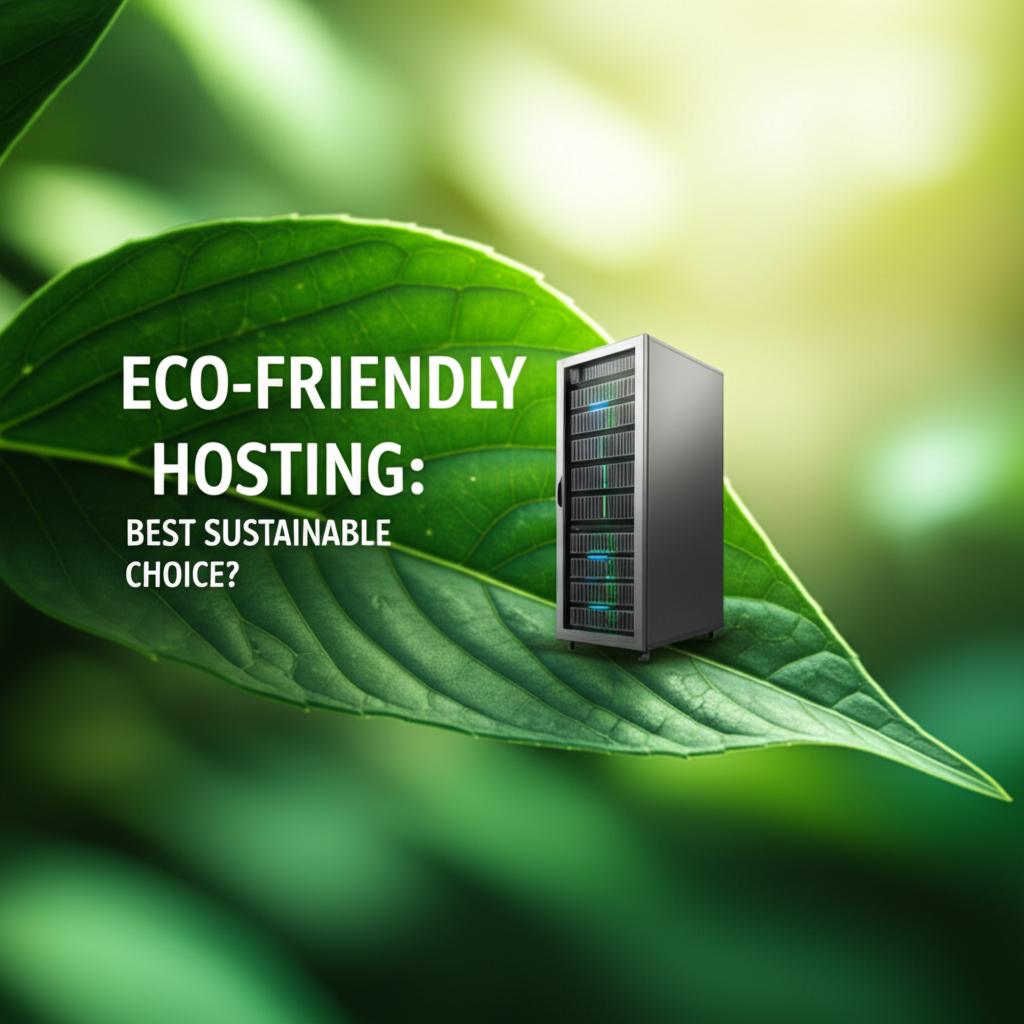- Understanding Eco-Friendly Hosting Practices
- The Benefits of Choosing Eco-Friendly Hosting
- Is Eco-Friendly Hosting Always the Best Choice? Navigating the Challenges
- Choosing the Right Eco-Friendly Hosting Provider: Key Considerations
Eco-Friendly Hosting: Best Sustainable Choice?
Eco-friendly hosting is becoming increasingly popular as individuals and businesses alike recognize the environmental impact of the digital world. But is it truly the best sustainable choice, or just another marketing buzzword? With data centers consuming vast amounts of energy, contributing to carbon emissions and electronic waste, the concern is valid. This article explores the world of green hosting, examining its benefits, drawbacks, and what to look for when making a sustainable choice for your website.
Understanding Eco-Friendly Hosting Practices

What exactly makes a hosting provider “eco-friendly”? It boils down to their commitment to minimizing their environmental footprint through various practices. These include:
Renewable Energy Sources: Leading green hosts power their data centers with renewable energy sources like solar, wind, hydro, and geothermal power. This significantly reduces reliance on fossil fuels, mitigating carbon emissions and combating climate change. Some companies even go carbon neutral, offsetting any remaining emissions through investments in environmental projects.
Energy-Efficient Infrastructure: Optimizing data center infrastructure plays a crucial role in reducing energy consumption. Utilizing efficient servers, cooling systems, and power management strategies minimizes wasted energy. Some providers embrace innovative technologies like free air cooling, reducing the need for energy-intensive air conditioning.
Waste Reduction & Recycling: Responsible e-waste management is another critical aspect of sustainable hosting. Providers committed to this practice prioritize extending the lifespan of their hardware, implementing robust recycling programs, and disposing of electronic waste responsibly.
Sustainable Certifications: Look for recognized certifications like Energy Star, Green-e, and ISO 14001. These certifications validate a company’s commitment to environmental responsibility and provide a level of transparency for consumers.
The Benefits of Choosing Eco-Friendly Hosting
Opting for eco-friendly hosting provides several benefits beyond simply reducing your environmental impact:
Positive Brand Image: Demonstrating your commitment to sustainability resonates with environmentally conscious customers and enhances your brand reputation. It showcases corporate social responsibility and positions your business as a responsible global citizen.
Support for Renewable Energy: By choosing green hosting, you directly support the growth and development of renewable energy sources. This contributes to a cleaner energy future and fosters a transition away from fossil fuels.
Reduced Operational Costs (Potentially): While not always guaranteed, the energy efficiency measures employed by eco-friendly hosts can potentially lead to lower operating costs for the provider, which might translate into competitive pricing for customers.
Future-Proofing Your Website: As environmental regulations become stricter and consumer awareness grows, sustainable practices will become increasingly important. Choosing green hosting now future-proofs your website and aligns it with evolving expectations.
Is Eco-Friendly Hosting Always the Best Choice? Navigating the Challenges
While eco-friendly hosting presents a positive step toward a sustainable digital future, it’s important to acknowledge some potential challenges:
Cost Considerations: Green hosting can sometimes be marginally more expensive than traditional hosting due to the investment in renewable energy and efficient technologies. However, the price gap is shrinking as the industry evolves.
“Greenwashing” Concerns: Be wary of providers who make vague or unsubstantiated environmental claims. Look for concrete evidence of their sustainable practices and verifiable certifications.
Limited Availability: While the number of green hosting providers is growing, the options might still be more limited compared to traditional hosting services.
Performance Trade-offs (Rarely): In rare cases, overly aggressive energy-saving measures could potentially impact server performance. However, reputable green hosts prioritize both sustainability and optimal performance.
Choosing the Right Eco-Friendly Hosting Provider: Key Considerations
When selecting an eco-friendly hosting provider, consider the following factors:
Transparency and Certifications: Look for providers who are transparent about their environmental practices and hold recognized certifications. Verify their claims and research their commitment to sustainability.
Renewable Energy Sources: Inquire about the specific renewable energy sources used by the provider. Some might purchase Renewable Energy Certificates (RECs), while others directly power their data centers with renewable energy.
Data Center Location: The location of the data center influences its environmental impact. Data centers in cooler climates often require less energy for cooling.
Customer Support and Features: Ensure the provider offers reliable customer support and the features necessary for your website’s needs, such as storage, bandwidth, and security.
By carefully evaluating these factors, you can confidently choose an eco-friendly hosting provider that aligns with your values and contributes to a more sustainable digital world. Making the switch to green hosting is a small yet significant step towards mitigating the environmental impact of the internet and creating a more sustainable future for all.











Leave a Reply